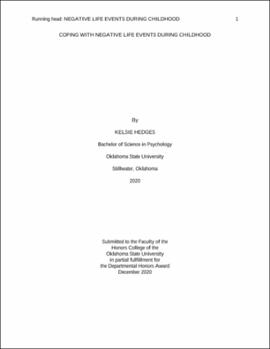| dc.contributor.author | Hedges, Kelsie | |
| dc.date.accessioned | 2021-04-20T13:53:24Z | |
| dc.date.available | 2021-04-20T13:53:24Z | |
| dc.date.issued | 2020-12-02 | |
| dc.identifier | oksd_hedges_HT_2020 | |
| dc.identifier.uri | https://hdl.handle.net/11244/329435 | |
| dc.description.abstract | Problem: Both negative and positive childhood experiences are predictors for adult outcomes. Adverse childhood experiences, such as death of a parent, parental separation or divorce, and exposure to domestic violence, increase risk for mental health issues from childhood into adulthood (Felitti et al., 1998). While these long-term negative effects have been well documented, recent research has focused on predictors of resilience. Resilient individuals are those that despite adversity show better than expected outcomes. Protective factors, such as social support, may be important in buffering these negative effects and promote resilience. Understanding these factors may be especially important in emerging adults. Emerging adults are in a period of rapid development and face multiple challenges, such as increased independence. | |
| dc.description.abstract | The current project examines the effects of resilience and social support on the link between adverse childhood experiences and adult adjustment in emerging adults. We predict that: (a) adverse childhood experiences will have a positive association with adult adjustment (anxiety, stress, depressive and trauma symptoms) in emerging adults; (b) level of perceived social support will be negatively associated with adult adjustment (anxiety, stress, depressive and trauma symptoms) in emerging adults; and (c) level of resilience will be negatively associated with adult adjustment (anxiety, stress, depressive and trauma symptoms) in emerging adults. Lastly, we explored the moderating effects of resilience and social support on the link between adverse childhood experiences and adult adjustment. | |
| dc.description.abstract | Methods: A total of 194 college students completed an online survey using Qualtrics software through the Psychology Department subject pool (SONA). Participants completed 6 questionnaires: 1) demographics questionnaire assessing basic descriptive information (age, sex, year in school, etc.) to describe our sample; 2) Adverse Childhood Experiences Survey-Revised (ACES-R), a 14-item questionnaire in which raters indicated which adverse experiences they had during childhood measures the degree of childhood adversity; 3) 21-item Depression Anxiety Stress Scale (DASS-21) to assess symptoms of depression, anxiety, and stress; 4) the PTSD Checklist for DSM-5 (PCL-5), a 20-item self-report measure of trauma symptoms; and 5) Connor-Davidson Resilience Scale (CD-RISC), a 25-item measure, to assess resilience; and 6) Multidimensional Scale of Perceived Social Support (MSPSS) to assess the protective factor of social support. | |
| dc.description.abstract | Results: Data collection is complete. Correlational analyses demonstrated significant positive associations between adverse experiences (ACES-14 scores) and adult adjustment (DASS Depression, Anxiety & Stress, and PCL-5 scores). In addition, adverse experiences were significantly negatively associated with resilience (CD-RISC scores) and with social support (MSPSS scores). Thus, our predictions were supported. To examine the role of protective factors on the link between adverse childhood experiences and adult adjustment, we utilized Bootstrapping with 5,000 resamples for moderation analyses. Our moderation model was significant. Both resilience and social support were moderators with respect to depression and PTSD symptoms. | |
| dc.description.abstract | This research could greatly contribute to our abilities to mitigate the risks, such as depressive, anxiety, stress, and trauma symptoms, associated with adverse childhood experiences. | |
| dc.format | application/pdf | |
| dc.language | en_US | |
| dc.rights | Copyright is held by the author who has granted the Oklahoma State University Library the non-exclusive right to share this material in its institutional repository. Contact Digital Library Services at lib-dls@okstate.edu or 405-744-9161 for the permission policy on the use, reproduction or distribution of this material. | |
| dc.title | Coping with negative life events during childhood | |
| osu.filename | oksd_hedges_HT_2020.pdf | |
| osu.accesstype | Open Access | |
| dc.type.genre | Honors Thesis | |
| dc.type.material | Text | |
| dc.contributor.director | Sullivan, Maureen | |
| dc.contributor.facultyreader | Ciciolla, Lucia | |
| thesis.degree.discipline | Psychology | |
| thesis.degree.grantor | Oklahoma State University | |
